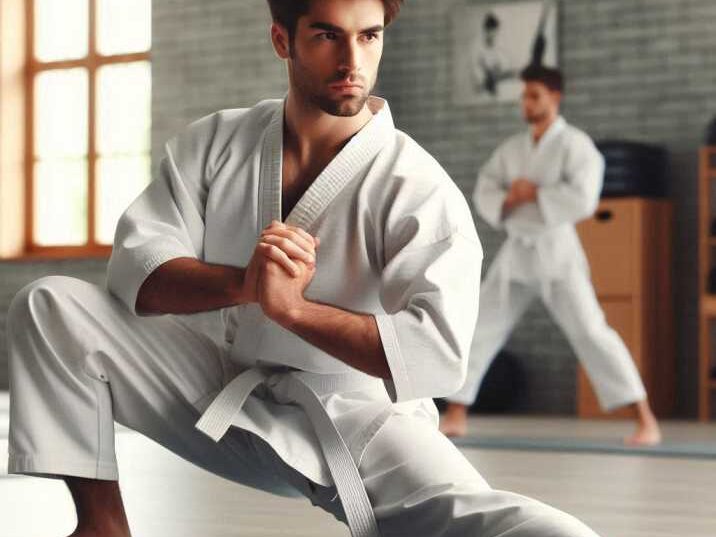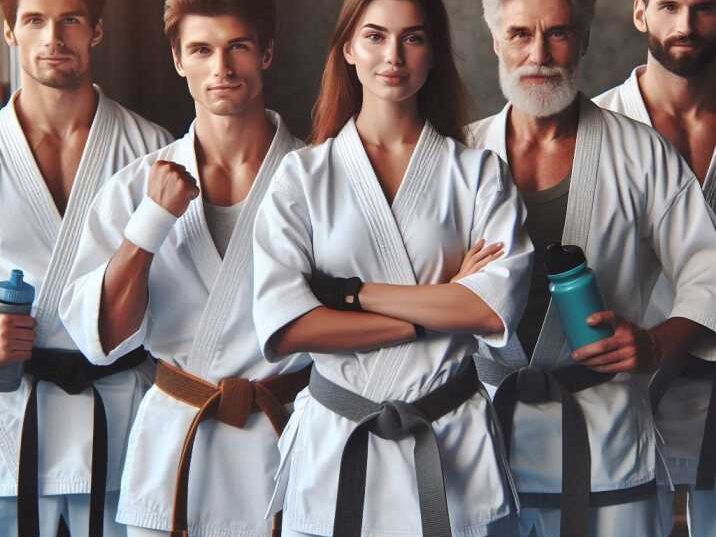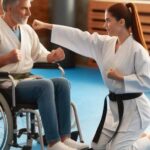Introduction
Table of Contents
Karate is one of the most popular martial arts practiced worldwide, known for its disciplined movements, self-defense techniques, and the mental strength it builds in its practitioners. But a common question arises: Can Karate be practiced by people of all fitness levels? Whether you’re an athlete, someone new to exercise, or even someone with physical limitations, this question is crucial when considering Karate as a potential activity. In this blog post, we’ll dive deep into how Karate can be tailored to suit various fitness levels, debunk myths about its physical demands, and explain why this martial art is more accessible than many realize.
By the end of this post, you’ll have a thorough understanding of how Karate can be practiced by people of all fitness levels and why it’s an excellent choice for personal development, regardless of your current fitness stage.

What is Karate and Its Core Elements?
Before answering the question, let’s first understand what Karate is. Karate originated in Okinawa, Japan, and focuses on striking techniques such as punching, kicking, elbow strikes, knee strikes, and open-hand techniques like knife-hands. Karate also incorporates blocking techniques to defend against attacks and some forms of grappling.
Key elements of Karate include:
- Kihon (Basics): The fundamental movements like punches, kicks, and blocks.
- Kata (Forms): Pre-arranged sequences of movements that simulate combat.
- Kumite (Sparring): Practicing techniques with a partner in a controlled environment.
The Myth: Do You Need to Be Extremely Fit to Start Karate?
One of the biggest misconceptions about Karate is that you need to be in top physical condition before you begin training. This myth can discourage beginners who feel they aren’t fit enough to keep up with the intensity.
While Karate does require some physical effort, the idea that you need to be extremely fit from the outset is far from the truth. In reality, Karate can be adjusted to match your fitness level, allowing for gradual improvement over time. Many dojos (Karate schools) focus on the individual’s pace rather than imposing a universal standard.
Can Karate Be Practiced by People of Different Fitness Levels?
1. Karate for Beginners with Low Fitness Levels
If you’re just starting your fitness journey or haven’t been physically active in a while, Karate can be an excellent option. Unlike some other sports or forms of exercise that demand a high level of cardiovascular fitness, Karate introduces new students to the basics at a slower pace. Beginners are often taught fundamental stances, strikes, and blocks that don’t require much endurance or strength. Over time, as students build their skills, they naturally improve their fitness.

Key Benefits for Low-Fitness Beginners:
- Gradual progression: You’ll start with basic movements and slowly advance.
- Improved flexibility: Karate training often involves stretches and low-impact moves, which help build flexibility.
- Boosted confidence: Even beginners will feel empowered by learning self-defense techniques that require more skill than fitness.
2. Karate for Athletes and Highly Fit Individuals
For those who are already athletic, Karate can provide a fresh challenge that tests endurance, coordination, and mental focus. Athletes often find that Karate’s emphasis on discipline and form complements their existing physical abilities. Advanced karate techniques can push the limits of even the fittest individuals, offering challenges like high kicks, complex kata sequences, and high-intensity sparring (kumite).
Key Benefits for Athletes:
- Full-body workout: Karate involves the use of almost all muscle groups, enhancing your overall strength and endurance.
- Mental focus: Even highly fit individuals benefit from Karate’s unique combination of physical exercise and mental discipline.
- Skill-based challenges: Karate focuses on precision and timing rather than just raw strength or endurance, providing a new form of challenge for athletes.
3. Karate for People with Physical Limitations
One of Karate’s greatest strengths is its adaptability. Many dojos work with students who have physical limitations, whether it be age, injury, or a medical condition. Karate can be modified to suit the abilities of each practitioner, making it accessible to a wide range of people. For example, some students may focus on upper-body techniques if they have lower-body limitations, or instructors may modify stances to accommodate balance issues.
Key Benefits for Those with Physical Limitations:
- Adaptive techniques: Instructors can adjust movements to suit individual needs.
- Improved balance and coordination: Karate helps improve physical coordination and muscle memory.
- Mental and emotional benefits: Beyond physical exercise, Karate offers mental resilience and self-confidence, which are vital for those dealing with limitations.
How Karate Improves Fitness Over Time
Regardless of your starting point, Karate naturally builds fitness over time. Here’s how:
1. Strength Training
Karate movements require the engagement of your core, arms, and legs. Over time, practicing Karate improves muscle tone and strength without needing external weights. Strikes, for example, help build upper-body strength, while stances strengthen the lower body.
2. Cardiovascular Endurance
Karate involves sequences of movements that elevate the heart rate. Though the pace is controlled at first, more advanced techniques and sparring sessions provide an excellent cardiovascular workout, improving stamina and lung capacity.
3. Flexibility
Stretching and movement in Karate improve flexibility, which is especially beneficial as practitioners age. A good range of motion not only enhances your Karate skills but also reduces the risk of injury in everyday life.
The Psychological and Emotional Benefits of Karate
Fitness is not only about the physical body but also about mental well-being. Karate promotes mental clarity, focus, and emotional balance. The discipline needed to learn and perfect Karate movements translates into improved self-confidence and stress relief, which contributes to overall mental fitness.
1. Building Self-Confidence
As you progress through Karate, mastering techniques and earning belts, the sense of achievement boosts self-esteem. The practice also teaches valuable lessons in perseverance and discipline, which can be carried into other areas of life.
2. Reducing Stress
Karate’s focus on breathing, focus, and mindfulness helps students manage stress. The physical exertion during training also helps release endorphins, improving mood and reducing feelings of anxiety.
Common Challenges and How to Overcome Them
As with any physical activity, there are challenges, but they can be overcome with the right mindset.
1. Feeling Intimidated as a Beginner
It’s natural to feel intimidated when starting Karate, especially if others in your class have been practicing for a long time. However, Karate is an individual journey, and progression is based on personal improvement, not comparison.
Solution:
- Focus on learning at your own pace, and remember that even the most advanced practitioners were once beginners.
2. Physical Fatigue
Karate can be tiring, especially during the early stages when your body is adapting to the new movements.
Solution:
- Prioritize recovery, hydrate well, and listen to your body. Over time, your stamina will improve.
The Table Summarizing How Karate Suits Different Fitness Levels:
| Fitness Level | Challenges | Karate Adaptations | Expected Benefits |
|---|---|---|---|
| Beginners | Low stamina, strength, flexibility | Slow-paced basics, low-impact techniques | Gradual improvement in strength, flexibility, confidence |
| Moderate Fitness | Plateau in progress | Intermediate techniques, moderate sparring | Increased endurance, muscle tone, and self-defense skills |
| High Fitness/Athletes | Need for challenge, fatigue | Advanced sparring, complex kata | Enhanced strength, precision, and mental focus |
| Physical Limitations | Limited mobility, injuries | Adaptive techniques, customized training | Improved balance, coordination, and flexibility |
| Older Adults | Joint pain, reduced energy | Slow-paced, low-impact, balance-focused | Better mobility, flexibility, and coordination |
Conclusion
Karate is a martial art that can be practiced by people of all fitness levels. Whether you’re just starting your fitness journey, already in peak condition, or have physical limitations, Karate offers a personalized path for growth and improvement. Its benefits extend beyond just physical fitness, enhancing mental well-being and emotional resilience.
Karate’s adaptability makes it an excellent choice for anyone looking to improve their fitness, learn self-defense, or engage in a disciplined and rewarding practice. So no matter where you’re starting from, Karate can be a part of your journey toward a healthier, more confident you.
FAQs About Karate and Fitness Levels
1. Can I start Karate if I’ve never exercised before?
Yes, Karate is designed to accommodate beginners and can be adjusted to fit your fitness level.
2. How long will it take to see fitness improvements through Karate?
Most practitioners notice improvements in strength, flexibility, and stamina within the first few months of consistent practice.
3. Is Karate safe for older adults?
Absolutely. Karate can be adapted to suit older adults, and many find it helps improve balance, flexibility, and overall well-being.
4. Will Karate help me lose weight?
Karate provides a full-body workout, and when combined with a healthy diet, it can aid in weight loss by burning calories and building muscle.
5. Can Karate be practiced with injuries?
Yes, instructors can modify techniques to accommodate injuries or physical limitations. It’s important to inform your instructor about any existing conditions.


